| Hammer Time
I am not proud to have to report that there were ugly scenes at the superb Bloomsbury Crime Party last month as Professor Barry Forshaw and I struggled to be the first to read a proof copy of the next Nordic Noir sensation, The Hanging to be published by Bloomsbury in June.
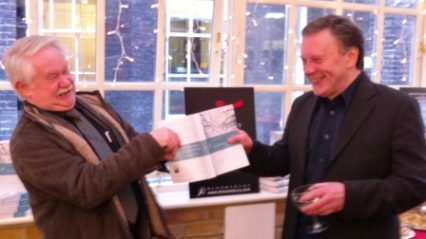
It was, of course, Scandicrime expert Barry who triumphed in our unseemly scuffle over the book, only for us both to discover that while we had been distracted, the authors – Danish brother and sister team Lotte and Søren Hammer – had been seduced by the mellifluous charms of millionaire playboy Prince Ali Karim.
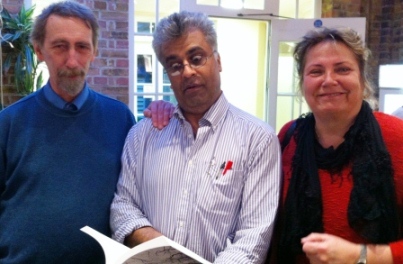
It is not known whether anyone has seen the Hammers since.
Orchids for Miss Aird
Orchids have often played a role in crime fiction. Miss Blandish, notoriously, didn’t have much luck with them and in one of Rex Stout’s excellent books (somebody will remind me which one), Nero Wolfe’s orchid greenhouse is machine-gunned by an enemy. Now orchid-growers in Calleshire are being sabotaged in Catherine Aird’s new novel Dead Heading from Allison & Busby, but the mayhem does not stop there and goes way beyond the scope of Gardeners’ Question Time.
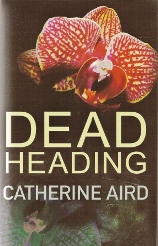
Calleshire, if you have to be told, is the fictional English county invented by Catherine Aird over forty years ago as the setting for her crime novels featuring police detectives C. D. (“Seedy”) Sloan and Crosby. In Dead Heading, Sloan and Crosby start a reluctant investigation into the wilful destruction of orchids being bred in nurseries and hot houses. Could this be the start of a turf war between Calleshire’s plantsmen and women or is the disappearance of a village busybody linked to the vandalism? When a prime suspect turns up dead, the Calleshire cops have their work cut out, though they might have got to the solution to the inter-linked mysteries sooner if they had listened to Gardeners’ Question Time…

Calleshire is a wonderful place; a place where mobile phones don’t exist and computers are mentioned only in passing. Being English and mostly rural, the county is naturally a hotbed of intrigue, secrets, petty jealousies and homicide. Catherine Aird’s earlier novels used to come with a map of the county and I really miss them. A traditional English mystery deserves a good map.
Sight Unseen
Regular readers will know that this column does not go in for gossip or unfounded speculation, so it is rare to recommend a book “sight unseen”. The exception to this rule is debut novel to be published by Headline in August: Precious Things by Colette McBeth.
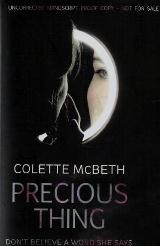
I have it on very good authority from an ‘insider’ in publishing (who must remain nameless, as all publishers should) that this novel could be “something special” indeed. If it turns out to be so, just remember you heard it here first.
75th Birthday
It is, amazingly, 75 years since Eric Ambler’s Cause For Alarm was first published and my much-thumbed paperback edition itself is almost 60 years old.
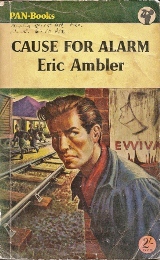 Ambler (1909-1998) was a major figure in the development of the modern British spy story and thriller and I feel rather silly having to explain that to anyone, but I suspect I have to. He was awarded the Crime Writers Diamond Dagger for lifetime achievement in 1986 but by at the time of his death, most if not all of his novels were out of print in his native land and in an ad hoc survey Shots readers visited dozens of bookshops only to be greeted with uniform blank stares when they asked for ‘anything by Eric Ambler’. Fortunately, the situation has been rectified in the 21st century. Ambler (1909-1998) was a major figure in the development of the modern British spy story and thriller and I feel rather silly having to explain that to anyone, but I suspect I have to. He was awarded the Crime Writers Diamond Dagger for lifetime achievement in 1986 but by at the time of his death, most if not all of his novels were out of print in his native land and in an ad hoc survey Shots readers visited dozens of bookshops only to be greeted with uniform blank stares when they asked for ‘anything by Eric Ambler’. Fortunately, the situation has been rectified in the 21st century.
Cause For Alarm was Ambler’s third or fourth novel and one of two he published in 1938. An agent (a literary one) once famously told him: “Most authors have second or even third book problems. You were lucky. All your problems were in your first!” Whatever those ‘problems’ by the time he wrote Cause For Alarm, he was in his stride.
I am particularly fond of the passages where the hero – an innocent English engineer caught up in shady dealings in Fascist Italy in 1937 – goes to the British Consulate in Milan seeking advice, reassurance or even a cup of tea. His reception is ultra-polite and friendly, but in terms of practical help completely useless. I empathise with the hero, Nick Marlow, as some sixty years later in the 1990s, whilst on business in Milan, I too was required to call upon the British Consulate and received an almost identical reception. I hasten to add that my visit had nothing whatsoever to do with espionage or gathering war clouds over Europe and I at least did get a cup of tea. Other than that, little seemed to have changed.
Italian Jobs
Any mention of Milan, northern Italy and/or Tuscany puts me in mind of my good friend the thriller-writing archaeologist Verbena Pastor and the perennial mystery of why her books take so long to get published in the UK. Writing as Ben Pastor, she has created a brace of excellent historical mysteries set in Ancient Rome and a gripping WWII series featuring reluctant detective Martin Bora, a Captain in the Wehrmacht. All are better known not only in the US, but also in Italian, German, Spanish and, I think, Czech editions.
Her first Martin Bora thriller, Lumen, took 12 years to find a UK publisher, and her second, Liar Moon took 11. Happily both are available here thanks to Bitter Lemon Press who, I believe, will publish the third in the series later this year after a gap of only 10 years!
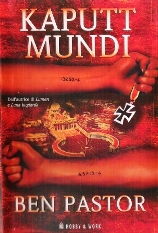
Bitter Lemon may well have to change the title – KaputtMundi – as it may be a pun too far for British readers who know neither German nor Latin, but for a book set in German-occupied Rome in 1944, I think it’s pretty neat. I am sure Bitter Lemon will do a good job – they usually do – but I give themfair warning that I don’t want to wait nine years (at the current rate) for Ben Pastor’s fourth Martin Bora book, just published in Italy as Il Cielo Di Stagno which I believe, though modern languages are not my strength, can be translated as Tin Sky.
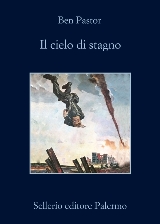
On Revival Day
In a project masterminded by Richard Reynolds of Heffers bookshop in Cambridge, a new series of republished detective novels from the so called ‘Golden Age’ is to appear under the London Bound imprint from Cambridge-based publisher Oleander Press. The first title to be released is The Charing Cross Mystery from 1923 by J. S. Fletcher.
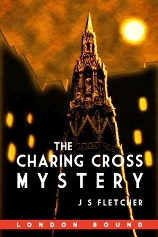
Now my first reaction was one of surprise, as I had no idea that the blessed Jessica Fletcher was so old. Some rapid research, however, informed me that the relevant Fletcher here is in fact the Yorkshire-born Joseph Smith Fletcher (1863-1935), the author of over 100 detective novels (and 100 other books), of which The Charing Cross Mystery is reckoned to be one of his best.
In search of further information about the author, I consulted a back copy of that radical left-wing newspaper The Yorkshire Post from 2006 to discover the following: “Having written more than 230 books, author J.S. Fletcher should be one of Yorkshire’s most favourite sons. So why has no one heard of him?”
I was beginning to despair that the same could be said of John Blackburn (1923-1993) although he was born a Geordie not a Yorkshireman, the author of some cracking and distinctive thrillers from 1958 up to 1985, including Blue Octavo (1963) and A Ring of Roses (1965)
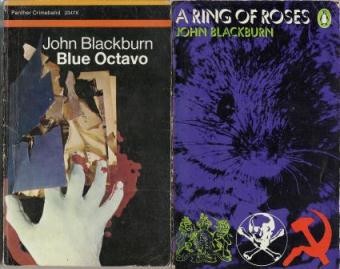
Blackburn had the knack of incorporating elements of science fiction, horror, the supernatural, germ warfare, Nazis and Cold War espionage into his thrillers like no-one else did, or probably could. He was, in many ways, the natural link between Dennis Wheatley and James Herbert in terms of popular British Gothic fiction.
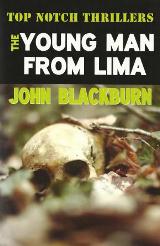
A few years ago I managed to revive his 1968 rollercoaster-ride of a thriller, The Young Man from Lima in the Top Notch Thrillers imprint and now I am delighted to say that an American publisher has taken up the baton. The new publishing house Valancourt Books (http://valancourtbooks.com/) is based in Kansas and seems to be the brainchild of some frighteningly young enthusiasts of British gothic fiction.
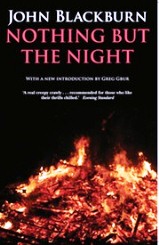 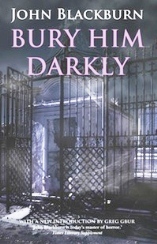
Apart from splendid reissues of John Blackburn titles Broken Boy, Bury Him Darkly and Nothing But the Night (which was filmed in 1973 starring Christopher Lee and Peter Cushing), Valancourt are to be congratulated on also republishing works by Gerald Kersh, Colin Wilson, Oliver Onions and the rare, sole novel by the poet Thomas Blackburn (John’s brother) The Feast of the Wolf.
Coming Up
I am looking forward to Adrian Magson’s new Harry Tate spy thriller Execution from Severn House, which I believe is the fifth is this solidly entertaining series.
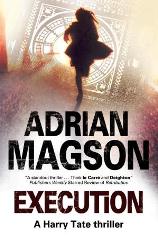
The book should be out any day now, though I have yet to see a copy. I have, however, been lucky enough to read an advance copy of the new Carl Hiaasen, coming from Sphere in June.
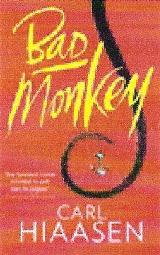
Hiaasen made a welcome return to form in Star Island in 2011 and I’m happy to report that he hasn’t let his mojo slip (whatever that means) in Bad Monkey. All the usual ingredients are there and as excruciatingly painful as usual, as the author takes revenge on all those who have despoiled the environment of his native Florida – although The Bahamas seem to be having similar problems with developers in this book too. One of the great running gags in Bad Monkey is the series of petty (and not so petty) acts of sabotage performed by the ‘hero’ on his neighbour, a particularly dim (if he doesn’t realise who planted the dead racoon or the beehive or the voodoo altar in his juggernaut show house) property developer.
And true to form there are the trademark Hiaasen gross-outs – the severed arm that just won’t stay buried and a vicious assault (by the hero!) on his girlfriend’s husband using a hand-held ‘dust-buster’ to force home his point – as well as numerous femmes fatales who can be trusted about as much as the Bad Monkey of the title. The scrofulous Bad Monkey is indeed bad, and a monkey, and an ex-film start to boot, having been fired from the set of Pirates of the Caribbean for bad behaviour!
Hi-Tech Revivals
I still have no real idea what a ‘Kindle’ is, though I see few if any being used on the Underground in London these days, but I must congratulate Transworld Digital for bringing the wonderful ‘Travis McGee’ crime novels of the late, great John D. MacDonald to a new, younger audience. And I believe they come with introductions from Lee Child, who appears to be as much a fan as I am.

I have to admit, it wasn’t always the case, for I came to John D. MacDonald at quite a late stage in my reading education. (Which has not stopped me from taking to task members of the Detection Club who have admitted in public that they have never read anything by the author many rightly call ‘The Boss’.)
The trouble was that as a callow youth, I was slightly embarrassed by the garish covers of the McGee books as they first appeared in paperback in the 1960s, each one featuring a rather vacant young female in a bikini at a disco, or possibly auditioning for a role in Rowan and Martin’s Laugh-In. It was only when I read one that I realised what I had been missing, for MacDonald’s 21-book Travis McGee series is not only an outstanding achievement in crime fiction terms, but in its way is a social history of Florida, where most of the McGee tales are set.

Now I am of an age where I cannot remember, let alone be embarrassed by, bikini-clad young ladies, I am extraordinarily proud of my collection of much-loved McGee paperbacks, many of which I have found in second-hand bookshops and a few in antique shops. Which is really rather fitting, as the man who insisted most strongly that I read them was none other than Jonathan Gash, the creator of Lovejoy, the ultimate rogue antique dealer.
A near neighbour of mine, Jonathan Gash and I actually commuted to London each day for several years and after constant nagging, I finally gave in and agreed to try a John D. MacDonald because, as Jonathan enthused “he’s really, really good”. He was and that’s another hat-tip I owe to Lovejoy.
|
|
Around the World in 80 Books (or at least 7)
For those of us who are infirm, crippled by taxes or subject to a variety of Passport restrictions, crime fiction is a relatively painless way of touring the world without risking (yet again) a diplomatic incident.
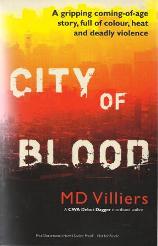
To begin far below the Equator in South Africa, I seriously recommend a quite stunning first novel, City of Blood by M.D. Villiers and published any day now by Harvill Secker. I also seriously recommend that no one visits the parts of Johannesburg described in this book, at least not without a heavily-armed police escort.
This is a weaving together of so many scams, double-crosses, crimes and betrayals committed by a large and fluid cast of characters, that at times I thought Elmore Leonard was directing the plot. It is that good, but my goodness it portrays a very dark and depressing slice of modern South African life where career criminals think nothing of using rocket-propelled-grenades against the police, who seem to have to sleep in their bullet-proof vests. This Jo’burg is indeed a city of blood where life seems cheap and the forces of law and order must be sorely tempted to leave the gangsters to fight it out among themselves. Ofcourse they can’t do that, or at least the two lead detectives in the book can’t and they – white Adrian and Zulu Robert – are a formidable double-act who will surely reappear in a sequel. Characters so interesting are not easy to create and they should be nurtured and not abandoned by the author, whom I believe is London-based Martie de Villiers.

If I have a criticism it is the perennial one of the fictional tourist. In his majestic South African thrillers, Deon Meyer always supplies a Glossary of South African terms and slang (they do have a lot of languages) and City of Blood could have benefited from one, though not having one is not a major flaw for even without one, this is a superior piece of work and proof, if further proof was needed, that South Africa is now a major player on the international crime writing scene.
And now on to Germany, which is a phrase I have not heard for many a year, where two forthcoming titles introduce new authors into English translation for the first time.

Snow White Must Die by Nele Neuhaus was first published in Germany in 2010 and in America earlier this year. Across Europe it proved a major bestseller and early reaction from the US seems highly favourable although a review in the Washington Post did warn that ‘So many subplots fork off the main narrative that this novel should be sold with a GPS’. Macmillan are to publish here in the UK in early July and the book features the detective duo of DI Pia Kirchoff and her rather aristocratic DS, Oliver von Bodenstein, of whom I suspect we will hear more. Originally a self-published author, Nele Neuhaus’ books have sold over three million copies in Germany and are now published in 21 countries.
In June, Harvill Secker publish Plan D by debut author (I think) Simon Urban, a thriller set in 2011 in a West Berlin where the Berlin Wall is still standing, the lead detective is East German and the murderer of the GDR’s chairman might possibly be a member of the secret police, the Stasi, everything being somehow linked to the mysterious ‘Plan D’.
In a way, Plan D is what publishers like to call at “What If” thriller where historical events are re-shaped to create an alternate world and sure enough, the blurb on Simon Urban’s book cannot resist a comparison with Robert Harris’ Fatherland, though they go a step too far, I feel, when they mention The Spy Who Came in from the Cold in the same breath.
However, the premise of a still-divided Germany in 2011 is an intriguing one, though whether the GDR (or DDR) is relieved at not joining the Euro is not clear. I myself never visited East Germany, though many British spy fiction authors did and there is a famous photograph of Julian Symons, Reginald Hill, Eric Ambler and Anthony Price posing at the Berlin Wall which for genuine legal reasons I cannot show here.
I did, however, once receive a curious postcard from thriller-writer Alan Williams, author of The Beria Papers, (who had many adventures in the DDR in his youth), though neither he nor I are really sure what it is meant to show.

It is a piece of East Germany art entitled “National Boundary” from 1976 and is described as a “Conversation Piece/Table Decoration.”
As so to sunny Spain in, hopefully, sunny June and specifically the 6th of June when two crime novels set, respectively, in La Mancha and Barcelona are published.
Jason Webster is that rare thing, and American with a well-worn passport who now lives in Spain. His new novel featuring his detective hero Max Camara is The Anarchist Detective, published by Chatto and Windus and is set in La Mancha which I did not know (though probably should have) is the saffron capital of the world, or at least western Europe.
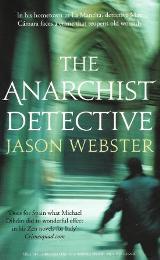
Jason’s debut novel (and Max Camara’s debut) Or the Bull Kills You caused quite a stir when published in 2010 with many a critic suggesting that a long-overdue thaw may be setting in on the icy grip of Scandinavian crime-writing. To be fair, the same was more or less said of Antonio Hill’s first novel The Summer of Dead Toys last year and I think I said something similar about Domingo Villar’s Death on a Galician Shore.

Now Antonio Hill’s Barcelona policeman Inspector Salgado returns in The Good Suicides from Doubleday and whilst it is good to see him back, I predict he will not be the last Spanish fictional cop to provide arresting reading this year.
And finally, rather like a Eurozone bailout inspector, I get to Greece; and not once, but twice.
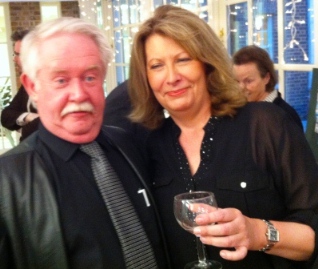
I was clearly astonished to realise, when confronted with the vivacious Anne Zouroudi, that I had never (for legal reasons) read any of her Greek mysteries featuring Hermes Diaktoros, who appears to be something of a combination of Father Brown, Miss Marple and Nero Wolfe.
Generously, Anne provided me with a copy of the seventh in the series, The Feast of Artemis, to be published by Bloomsbury, which I am not only gorging on but also stealing recipes from. That is not as weird as it sounds when you consider that each of the seven mysteries featuring ‘the fat man’ Diaktoros deals with one of the seven deadly sins and this time it’s the turn of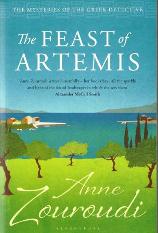 gluttony. Although copious amounts of food and drink are consumed in this book, because the setting – wonderfully described – is hot, lemon-scented and as relaxing as a shady olive grove, gluttony has never seemed less sinful, though from the start there are clear tensions as the ‘Feast’ involves a competitive sheep-roast between rival families in the small town of Dendra. From this novel I learned that the Greek dish kleftiko (translated as ‘stolen meat’) comes from the activities of sheep-rustlers who baked stolen animals in covered pits to prevent smoke giving away their location and that Hermes Diaktoros never travels without a supply of his aunt’s hangover-cure powders which (he thinks) contain wormwood, a plant known for its medicinal use since ancient times and as a key ingredient of absinthe. gluttony. Although copious amounts of food and drink are consumed in this book, because the setting – wonderfully described – is hot, lemon-scented and as relaxing as a shady olive grove, gluttony has never seemed less sinful, though from the start there are clear tensions as the ‘Feast’ involves a competitive sheep-roast between rival families in the small town of Dendra. From this novel I learned that the Greek dish kleftiko (translated as ‘stolen meat’) comes from the activities of sheep-rustlers who baked stolen animals in covered pits to prevent smoke giving away their location and that Hermes Diaktoros never travels without a supply of his aunt’s hangover-cure powders which (he thinks) contain wormwood, a plant known for its medicinal use since ancient times and as a key ingredient of absinthe.
Such useful nuggets of information, not to mention the brilliant sense of place created, have certainly convinced me that I should allow Anne Zouroudi to tempt me with the other six deadly sins.
Quite coincidentally, I was halfway through The Feast of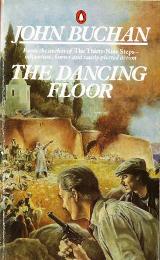 Artemis when I was given another thriller with a Greek setting: John Buchan’s The Dancing Floor, which was first published in 1926. Artemis when I was given another thriller with a Greek setting: John Buchan’s The Dancing Floor, which was first published in 1926.
The Dancing Floor features Buchan’s ‘other’ hero (i.e. not Richard Hannay), Sir Edward Leithen, who Richard Usborne in his 1953 critical study Clubland Heroes described as ‘the perfect, gentle knight’ and suggests that Leithen may be the most autobiographical character Buchan created. The book, set either side of the Great War, involvespagan rites on a remote Greek island and the strange connection to them, through dreams, of a young Englishman. It’s good Buchanesque stuff but, so far, I have not come across a decent lamb recipe or hangover cure.
Civil War
The English Civil War is one of the periods of history least plundered by thriller writers, though having said that I suspect I will be quickly corrected and probably threatened by members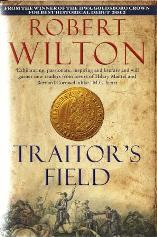 of The Sealed Knot Society. Yes, I know Lindsey Davies and Tom Holland (before he became the go-to historian for the Roman Republics and the Persian Empire) have both written novels set then and even the late, great Reginald Hill (writing as Charles Underhill) toyed with the period in his adventures of Captain Fantom. of The Sealed Knot Society. Yes, I know Lindsey Davies and Tom Holland (before he became the go-to historian for the Roman Republics and the Persian Empire) have both written novels set then and even the late, great Reginald Hill (writing as Charles Underhill) toyed with the period in his adventures of Captain Fantom.
But now comes Robert Wilton’s Traitor’s Field from Corvus, a thriller set in 1648 and featuring John Thurloe, an official in the service of Oliver Cromwell pitted against the Royalist intelligence network and something sinister called the Comprollerate-General for Scrutiny and Survey (ominously known as the ‘SS’.)
I am looking forward to this book as I am old enough to remember the stir caused by the books of John Sanders when he introduced the Cromwellian secret agent often described as the James Bond of the 17th century Nicholas Pym in A Firework For Oliver in 1964.
 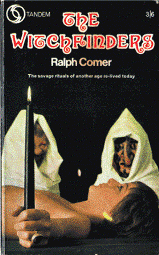
There were only four or five Nicholas Pym adventures before he seemed to disappear around 1971, and I could never find out much about author John Sanders, although an erudite bibliophile recently told me that under the pen-name Ralph Comer he wrote a couple of Gothic horror novels, which were highly regarded in Spain, Germany and the USA.
Bring and Buy
At a recent Bring and Buy sale held in the grounds of Ripster Hall for the waifs and strays of the estate, I noticed a much-loved paperback I had never seen before, Cocos Gold by ‘Ralph Hammond’, and published as a ‘Junior Fontana’ – a Collins imprint I had never heard of.
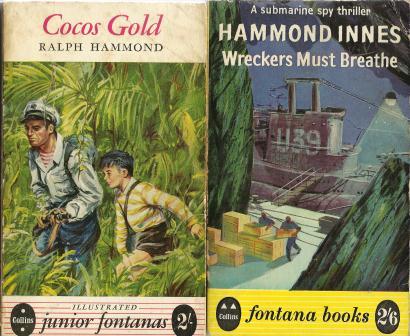
Originally published for ‘young adults’ as we would now say, in 1950, the author was, of course, (Ralph) Hammond Innes, one of the leading British thriller writers of the 1940s and ’50s, who was still writing novels up to his death in 1998.
To be serious for a moment
It is pure coincidence I know, but spooky nonetheless, that I was reading an advance proof of Nathaniel Philbrick’s excellent history of Boston during the American Revolution, Bunker Hill, published this month by Transworld, when I heard a radio news report of the outrage at the Boston Marathon.
 Now whilst I have little in common with Marathon runners (and nothing but disdain for whoever perpetrated the outrage), I feel for the city of Boston which, whenever I have visited it, offered me great and generous hospitality. Now whilst I have little in common with Marathon runners (and nothing but disdain for whoever perpetrated the outrage), I feel for the city of Boston which, whenever I have visited it, offered me great and generous hospitality.
A few days after the Boston horror I turned back to crime fiction and picked up an advance proof of The Silent Wife by Canadian A.S.A. Harrison, due out from Headline next month. I was reading it as an ominous email arrived from the publisher.
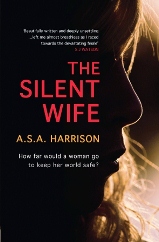 
The Silent Wife, which comes with advance praise from Sophie Hannah and Kate Atkinson among many others, will now sadly be published posthumously as Headline had the onerous task of announcing the death of author Susan Harrison, aged 65, a matter of weeks before her debut novel is due to appear.
Forty Years On
A place on my to-be-read table has already been reserved for July for The Shanghai Factor (published by Head of Zeus) by that old spymaster Charles McCarry.

It is forty years since the ex-CIA operations officer McCarry swapped his cloak and dagger for a typewriter and published his debut novel The Miernik Dossier in 1973. His series of novels featuring the urbane American agent Paul Christopher soon earned him the reputation of ‘America’s best spy novelist’.

I’m delighted that Mr McCarry, now in his eighties, is producing new work, and that some of his greatest hits, including The Miernik Dossier, The Tears of Autumn and The Secret Lovers, have been attractively reissued in paperback here by Duckworth.
Going Viking
Many years ago at a crime writers’ convention where, I admit,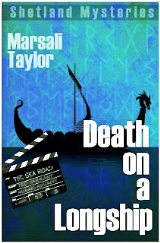 drink had been taken, an impossibly young Ian Rankin and I were debating the concepts of ‘the locked room mystery’ and the ‘closed circle of suspects’ in traditional whodunits. We decided, in a fit of joint inspiration, that the ultimate setting for such a murder mystery must be a Viking longship out on the high seas (somewhere, say, between Greenland and Rhode Island). No one could get on or off the boat which was of course, an open rowing boat where everyone could see everyone else. One night, one of the rowers is horribly murdered yet none of the other Vikings sees a thing. drink had been taken, an impossibly young Ian Rankin and I were debating the concepts of ‘the locked room mystery’ and the ‘closed circle of suspects’ in traditional whodunits. We decided, in a fit of joint inspiration, that the ultimate setting for such a murder mystery must be a Viking longship out on the high seas (somewhere, say, between Greenland and Rhode Island). No one could get on or off the boat which was of course, an open rowing boat where everyone could see everyone else. One night, one of the rowers is horribly murdered yet none of the other Vikings sees a thing.
Recently, I thought our rather surreal suggestion had been taken up by author Marsali Taylor in her new book Death on a Longship, but this turns out to be a modern day ‘Shetland Mystery’ and not a 10th century saga.
When Ian Rankin and I were asked who could possibly ‘solve’ our hypothetical murder on a Viking longship, it was Ian who said, without missing a beat: “That would be a case for Inspector Norse.”
Toodles
The Ripster
|